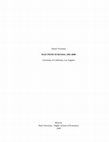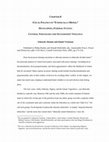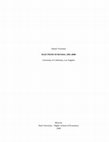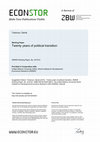Papers by Daniel Treisman
RePEc: Research Papers in Economics, Nov 1, 2003
During the 1990s, Russia underwent an extraordinary transformation from a communist dictatorship ... more During the 1990s, Russia underwent an extraordinary transformation from a communist dictatorship to a multi-party democracy, from a centrally planned economy to a market economy, and from a belligerent adversary of the West to a cooperative partner. Yet a consensus in the US circa 2000 viewed Russia as a disastrous and threatening failure, and the 1990s as a decade of catastrophe for its citizens. Analyzing a variety of economic and political data, we demonstrate a large gap between this perception and the facts. In contrast to the common image, by the late 1990s Russia had become a typical middle-income capitalist democracy.
University Microfilms International eBooks, 1995
ABSTRACT Thesis (Ph. D.)--Harvard University, 1995. Includes bibliographical references.
Princeton University Press eBooks, Mar 23, 2023
Foreign Affairs, 2000
... 2 After the Deluge of Poland, Hungary, and Czechoslovakia made this jump from moral absolutes... more ... 2 After the Deluge of Poland, Hungary, and Czechoslovakia made this jump from moral absolutes to presidential ... But similar divisions emerged at all levels of state and society. ... Results of early elections showed a country with a political spectrum that ran not so much from left to ...

RePEc: Research Papers in Economics, May 1, 2016
In this paper, I review the main trends in voting in national elections in Russia since 1991, dis... more In this paper, I review the main trends in voting in national elections in Russia since 1991, discuss the evidence of manipulation or falsification by the authorities, and use statistical techniques to examine the determinants of voting trends. The emphasis is on explaining change over time in the vote shares of different parties or groups of parties, not on identifiying social, economic, or opinion correlates of individuals' party choice at a given point in time-a subject that has been well-studied in previous work by various scholars. My goal is to provide a relatively comprehensive introduction to the changing electoral landscape in the two decades since the birth of the independent Russian state. The paper offers a more detailed and technical examination of the evidence that is summarized in Chapter 10 of my book manuscript titled The Return: Russia's Journey from Gorbachev to Medvedev.

RePEc: Research Papers in Economics, 2001
ABSTRACT Recent commentators on Russia's economic reforms have almost uniformly declared ... more ABSTRACT Recent commentators on Russia's economic reforms have almost uniformly declared them a disappointing and avoidable failure. In this book, two American scholars take a new and more balanced look at the country's attempts to build capitalism on the ruins of Soviet central planning. They show how and why the Russian reforms achieved remarkable breakthroughs in some areas but came undone in others. Unlike Eastern European countries such as Poland or the Czech Republic, to which it is often compared, Russia is a federal, ethnically diverse, industrial giant with an economy heavily oriented toward raw materials extraction. The political obstacles it faced in designing reforms were incomparably greater. Shleifer and Treisman tell how Russia's leaders, navigating in uncharted economic terrain, managed to find a path around some of these obstacles. In successful episodes, central reformers devised a strategy to win over some key opponents, while dividing and marginalizing others. Such political tactics made possible the rapid privatization of 14,000 state enterprises in 1992-1994 and the defeat of inflation in 1995. But failure to outmaneuver the new oligarchs and regional governors after 1996 undermined reformers' attempts to collect taxes and clean up the bureaucracy that has stifled business growth. Renewing a strain of analysis that runs from Machiavelli to Hirschman, the authors reach conclusions about political strategies that have important implications for other reformers. They draw on their extensive knowledge of the country and recent experience as advisors to Russian policymakers. Written in an accessible style, the book should appeal to economists, political scientists, policymakers, businesspeople, and all those interested in Russian politics or economics.
Comparative Political Studies
Influential voices contend that democracy is in decline worldwide and threatened in the US. Using... more Influential voices contend that democracy is in decline worldwide and threatened in the US. Using a variety of measures, I show that—while there has been some recent backsliding—the global proportion of democracies remains close to an all-time high. The current rate of deterioration is not historically unusual and is well explained by the lower income and unseasoned institutions of many new democracies swept upwards in the Third Wave. Historical data suggest the probability of democratic breakdown in the US is extremely low. Western governments are seen as threatened by weakening popular support for democracy and an erosion of elite norms. But systematic evidence for these claims is very limited. While eroding democratic quality in some countries is indeed a cause for concern, the fear of a global slide into autocracy appears premature.
During the 1990s, Russia underwent an extraordinary transformation from a communist dictatorship ... more During the 1990s, Russia underwent an extraordinary transformation from a communist dictatorship to a multi-party democracy, from a centrally planned economy to a market economy, and from a belligerent adversary of the West to a cooperative partner. Yet a consensus in the US circa 2000 viewed Russia as a disastrous and threatening failure, and the 1990s as a decade of catastrophe for its citizens. Analyzing a variety of economic and political data, we demonstrate a large gap between this perception and the facts. In contrast to the common image, by the late 1990s Russia had become a typical middle-income capitalist democracy.

Does fiscal power sharing exacerbate or alleviate tensions in ethnically divided states? 1 Do par... more Does fiscal power sharing exacerbate or alleviate tensions in ethnically divided states? 1 Do particular patterns of central fiscal policy associated with power sharing-including fiscal decentralization, fiscal proportionality, and fiscal appeasement-affect the likelihood of violent bids for secession? Many experts on power sharing would include fiscal decentralization and proportionality rules in their toolbox of devices for avoiding ethnic conflict. In this chapter, we study four noted cases, hoping to understand better whether or not such devices truly belong there. The four cases-India, Pakistan, Nigeria, and the former Yugoslavia-are ethnically divided in a specific way. Between 1945 and the early 1990s, the world contained 10 federal states in which (for at least part of the period) at least one ethnic group was both a majority within one of the constituent units and a minority within the federation as a whole (see Table 8.1). 2 We call such groups "local-majority/countrywide-minority ethnicities" or simply "majority/minority ethnicities," and the states that contain them "ethnically-mined federations," since the
RePEc: Research Papers in Economics, Jun 1, 2015
, and the 2015 APSA convention, as well as two anonymous referees, for helpful comments. The view... more , and the 2015 APSA convention, as well as two anonymous referees, for helpful comments. The views expressed herein are those of the authors and do not necessarily reflect the views of the National Bureau of Economic Research. NBER working papers are circulated for discussion and comment purposes. They have not been peer-reviewed or been subject to the review by the NBER Board of Directors that accompanies official NBER publications.

arXiv (Cornell University), May 18, 2016
In this paper, I review the main trends in voting in national elections in Russia since 1991, dis... more In this paper, I review the main trends in voting in national elections in Russia since 1991, discuss the evidence of manipulation or falsification by the authorities, and use statistical techniques to examine the determinants of voting trends. The emphasis is on explaining change over time in the vote shares of different parties or groups of parties, not on identifiying social, economic, or opinion correlates of individuals' party choice at a given point in time-a subject that has been well-studied in previous work by various scholars. My goal is to provide a relatively comprehensive introduction to the changing electoral landscape in the two decades since the birth of the independent Russian state. The paper offers a more detailed and technical examination of the evidence that is summarized in Chapter 10 of my book manuscript titled The Return: Russia's Journey from Gorbachev to Medvedev.

Palgrave Macmillan UK eBooks, 2012
Die Dokumente auf EconStor dürfen zu eigenen wissenschaftlichen Zwecken und zum Privatgebrauch ge... more Die Dokumente auf EconStor dürfen zu eigenen wissenschaftlichen Zwecken und zum Privatgebrauch gespeichert und kopiert werden. Sie dürfen die Dokumente nicht für öffentliche oder kommerzielle Zwecke vervielfältigen, öffentlich ausstellen, öffentlich zugänglich machen, vertreiben oder anderweitig nutzen. Sofern die Verfasser die Dokumente unter Open-Content-Lizenzen (insbesondere CC-Lizenzen) zur Verfügung gestellt haben sollten, gelten abweichend von diesen Nutzungsbedingungen die in der dort genannten Lizenz gewährten Nutzungsrechte. Terms of use: Documents in EconStor may be saved and copied for your personal and scholarly purposes. You are not to copy documents for public or commercial purposes, to exhibit the documents publicly, to make them publicly available on the internet, or to distribute or otherwise use the documents in public. If the documents have been made available under an Open Content Licence (especially Creative Commons Licences), you may exercise further usage rights as specified in the indicated licence.

MIT Press Books, 2001
ABSTRACT Recent commentators on Russia's economic reforms have almost uniformly declared ... more ABSTRACT Recent commentators on Russia's economic reforms have almost uniformly declared them a disappointing and avoidable failure. In this book, two American scholars take a new and more balanced look at the country's attempts to build capitalism on the ruins of Soviet central planning. They show how and why the Russian reforms achieved remarkable breakthroughs in some areas but came undone in others. Unlike Eastern European countries such as Poland or the Czech Republic, to which it is often compared, Russia is a federal, ethnically diverse, industrial giant with an economy heavily oriented toward raw materials extraction. The political obstacles it faced in designing reforms were incomparably greater. Shleifer and Treisman tell how Russia's leaders, navigating in uncharted economic terrain, managed to find a path around some of these obstacles. In successful episodes, central reformers devised a strategy to win over some key opponents, while dividing and marginalizing others. Such political tactics made possible the rapid privatization of 14,000 state enterprises in 1992-1994 and the defeat of inflation in 1995. But failure to outmaneuver the new oligarchs and regional governors after 1996 undermined reformers' attempts to collect taxes and clean up the bureaucracy that has stifled business growth. Renewing a strain of analysis that runs from Machiavelli to Hirschman, the authors reach conclusions about political strategies that have important implications for other reformers. They draw on their extensive knowledge of the country and recent experience as advisors to Russian policymakers. Written in an accessible style, the book should appeal to economists, political scientists, policymakers, businesspeople, and all those interested in Russian politics or economics.

Gorbachev, Yeltsin, Putin, Medvedev, perestroika, Soviet Union disintegration, North Atlantic Tre... more Gorbachev, Yeltsin, Putin, Medvedev, perestroika, Soviet Union disintegration, North Atlantic Treaty Organization (NATO) enlargement, privatization, organized crime, corruption, the Chechen wars, the Georgian war-all of these events, political figures, and phenomena are laid out in Daniel Treisman's The Return: Russia's Journey from Gorbachev to Medvedev. The book is an illustrated volume, which judging by the main character of its illustrations focuses on the Russia of the 1990s, while the very idea of the "return" relates equally to the 1990s and 2000s. In my view, the return in the context of Russia denotes two things: first, it declares Russia's comeback to the world community from its communist past; second, less obvious, but no less important, it manifests Russia's return to the stage of global politics, putting an emphasis on strengthening its vision for the multipolar world, BRICS (Brazil, Russia, India, China, South Africa) membership, new westernized patterns of consumption, development of large resource-based corporations and their international outreach, and at least a partial restoration of its military might. More importantly, it is the de facto reunification of the Russian Federation by preventing it from disintegrating in quasiautonomous regions and republics and eventually falling apart. Unfortunately, The Return by Treisman is limited to the former, while it is the latter that would be more up to date and of interest to the reader. The journey element is not as good, because it suggests that Medvedev is, or was, an important figure in the Russian leadership clique. Although chronologically correct, the journey should instead have been written from Gorbachev to Putin. Despite all the arguments in the scholarly literature and journalistic pieces "for" and "against" Russia, its "return" is fact rather than a mere discussion point. But Russia is here to stay, says Treisman. To describe this return, rather than rigorous scholarly language, the author chooses the colourful journalistic discourse typical of a publicist book. Behind this language there is a purpose. Daniel Treisman's The Return: Russia's Journey from Gorbachev to Medvedev is nothing but a political sequel to Shleifer's economist-oriented A Normal Country: Russia After Communism, 1 where the author follows Russia's economic performance and argues that post-Soviet Russia has not been a disastrous failure and that the facts say otherwise. One negative feature that the author includes about Russia is that this is the country ".. . where alcoholism, encouraged by the extremely low cost of vodka, is taking an extraordinary toll on life expectancy and aggravating crime" (p. 388). Here, Treisman repeats Shleifer, who remarked that Russia's major problem is alcoholism,
Foreign Affairs, Mar 5, 2014

Uploads
Papers by Daniel Treisman